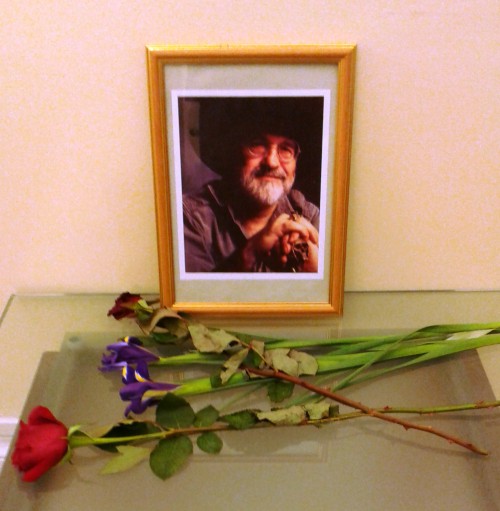27th March 2015
True Grit
Sir Terry Pratchett, the witty creator of Discworld
I don’t read fantasy books – they’re just not my taste. So I’ve not read any novels by Sir Terry Pratchett, the author who died two weeks ago.
He wrote 40 novels about an imaginary place called “Discworld” which was, apparently, a “flat disc balanced on the backs of four elephants which, in turn, stand on the back of a giant turtle” which swims through the cosmos. And the seas perpetually pour over the sides of the disc. That’s well beyond the scope of my imagination.
He was the best selling author in Britain in the 1990s, until J K Rowling’s series of books about Harry Potter. He sold over two million books a year in Britain, and his worldwide sales were over 80 million (and still growing, I guess).
He also wrote at a remarkable pace, often publishing two books a year in his early career. And all the time he developed the complexity of Discworld, so that the novels remained fresh and full of new detail.
He was also very approachable. He interacted extensively with his readers and fans, attended lots of conventions devoted to his work, and responded to the many letters and messages that he received.
After reading about his work, I realise that humour played a large part in his success, and he parodies all sorts of writers, and narratives. I have enjoyed finding quotations from his life and work, such as:
The trouble with having an open mind, of course, is that people will insist on coming along and trying to put things in it.
and
I’ll be more enthusiastic about encouraging thinking outside the box when there’s evidence of any thinking going on inside it.
Even though I’m not interested in “fantasy”, I appreciate his comment that “stories of imagination tend to upset those without one”. His novels cover many aspects of our lives and the strangeness of our existence. His novels included a character called Death, who was indeed the bringer of death to other characters.
I wasn’t aware of Pratchett’s popularity around the world, until I heard that some Belarusians wanted to express their condolences. As readers of our Facebook page will know, they came to the embassy and left a small tribute to him. They told my colleagues that it was the way he captured the essence of human existence that attracted them to his work. 
Fighting Alzheimer’s
Pratchett was more than an author who wrote with wit and wisdom.
Eight years ago he was diagnosed with a form of Alzheimer’s disease, or dementia, which damages the brain’s cognitive functions. This affects language, memory and thought amongst other things. He faced a steady decline and found it increasingly difficult to write.
Rather than accept his illness, he spoke out about it. He noted that very little money went into research into Alzeihmer’s, and gave a lot of his own money to researchers. He started campaigning to raise more money for research, and also campaigned for the right to end life early by assisted suicide.
He lobbied the authorities about the issue and compared the lack of resources for research into dementia to the significantly larger amounts given to cancer research in Britain. He lobbied both the last Labour government and the current Conservative-Liberal Democrat coalition about the issue.
Incidence of dementia has been growing around the world, partly as a result of increased longevity in many countries, as well as improved diagnosis. More than 35 million people are now living with dementia, around the world in many different countries.
Caring for sufferers of dementia is likely to become more important in the coming years as the cost of social care soars. The estimated worldwide cost of dementia in 2010 was just over US$600m and will rise to a staggering US$1.2 trillion by 2030.
The battle rages on…
I don’t know if he was aware, but I hope Sir Terry would have been cheered that, in the week following his death, the World Health Organisation hosted the first ever global Ministerial conference on Dementia. My government, through the Department of Health, sponsored the conference and played a major role in bringing these countries together and securing political commitment through a “call to action”. The conference followed a “Dementia Summit”, which the Prime Minister hosted as part of the UK’s G8 Presidency in 2013.
Diplomacy isn’t just about the political relations between nations. Diplomats are often involved in mobilising support amongst other nations to find solutions to the common difficulties we all face, be they climate change, or responding to natural disasters, or to fighting diseases from Ebola to dementia.
Such issues aren’t always the top priority of governments. It often needs the advocacy of someone famous to draw attention and to demand action – just as Sir Terry did for dementia, in conjunction with others.
But it wasn’t easy for him. He couldn’t bring himself to call it by its name, and instead called it his “embuggerance”. It must have been hard to have kept campaiging about the issue as he did, including attending many public appearances to talk about it. To my mind that it is true grit – he faced his disease in front of others.
It was a nice surprise to discover that this author from my country touched the feelings of people in Belarus. And I’m glad that they came and paid their respects on his passing.
To Sir Terry, the last word:
“The truth may be out there, but the lies are inside your head.” A footnote in his book “Hogfather”.
“It is said that your life flashes before your eyes just before you die. That is true, it’s called Life.”